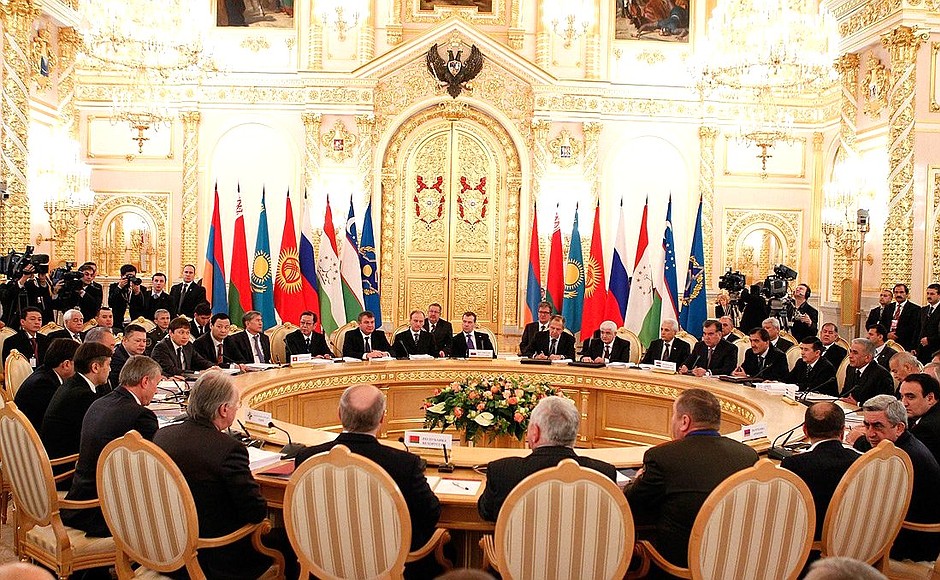
President of Russia Dmitry Medvedev: Colleagues, we have just concluded a restricted format meeting, where we reviewed the implementation of previous Collective Security Council decisions and the consultations we held after the informal CSTO summit in Kazakhstan. We talked about ways to make our organisation more effective and considered approaches to our security cooperation.
We have reached agreement on some issues though not on others, but that is only natural. It is also absolutely normal that we will continue to discuss a number of subjects. Today, we will need to debate and sign a number of documents and decisions on matters that have been agreed upon by CSTO member states.
At this meeting, the rotating chairmanship of the statutory bodies will be transferred from Belarus to Kazakhstan. In line with tradition, our Kazakhstani partners have presented their vision of the organisation’s activities in the coming period.
On behalf of all heads of CSTO member states I would like to thank President of Belarus Alexander Lukashenko for his effective and very persistent efforts as Chairman of the CSTO Collective Security Council.
President of Kazakhstan Nursultan Nazarbayev: Colleagues, meeting participants,
I would like to thank the President of Russia and the Russian side for its hospitality and for the excellent organisation of this meeting. I would also like to thank Mr Alexander Lukashenko for the great work he has done. All of us have expressed our appreciation of his efforts.
”The decision we have adopted regarding the military bases of third countries is vitally important for the consolidation of our positions within the CSTO.“
As Kazakhstan assumes the role of Chairman [of the CSTO Collective Security Council], it will take all the necessary measures to ensure the ongoing development of our organisation.
We have submitted our proposals on the coming year’s priorities to the other leaders. We believe it is necessary first of all to focus on the practical implementation of the decisions adopted today within the CSTO framework.
I would like to inform you that we have held fruitful discussions in restricted format, where we talked about some very serious issues. The most important outcome of our meeting was an agreement on the coordination of military infrastructure deployment by non-members of CSTO on the territory of the CSTO member states. Now, in order to deploy a military base of a third country on the territory of a CSTO member state, it will be necessary to obtain official approval of all CSTO members. The proposal was accepted by all CSTO member states. I think this is a clear sign of the organisation’s unity and its members’ utmost loyalty to allied relations.
Other issues – the so-called second protocol – have been either dropped or rescheduled for discussion at future meetings. We have also reached agreement on the armament of CRRF [Collective Rapid Reaction Force], the formation of special task forces and rescue teams as part of the CRRF. We have adopted decisions on the CSTO member states’ information security, the response procedure in industrial accidents and natural disasters, determined the funding allocated by CSTO member states for the Collective Peacekeeping Forces and approved the budget for 2012.
As a summary document for the meeting, the CSTO Collective Security Council has adopted a declaration on the 20th anniversary of the Treaty on Collective Security and the 10th anniversary of our organisation.
Dmitry Medvedev: There is a suggestion that we move on to the signing. The only thing I would like to note on behalf of all Collective Security Council members is that the decision we have adopted regarding the military bases of third countries is vitally important for the consolidation of our positions within the CSTO. I believe that this is a crucial issue on which all parties have reached agreement. I just wanted to draw your attention to it and thank everyone who took part in the talks.
<…>